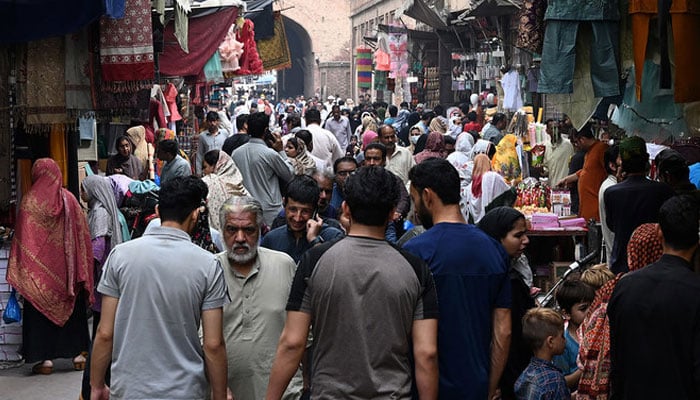River of fire
Care to cast your mind back to May of 2023? Consumer prices skyrocketed by a staggering 38 per cent in just one year, sending shockwaves through all Pakistani households and rattling the very foundation of financial stability. Care to remember that the price of wheat flour had gone up by an unprecedented 99 per cent in just one year. That was rock bottom. Care to remember that the price of eggs and rice had gone up by 90 per cent and 85 per cent in just one year, respectively. Those were the dark days, a time when the grocery bill felt like a cruel punch to the gut. We lived through a river of fire.
Please recall what it was like in May 2023? Motor fuel had gone up by 64 per cent. That was a time of extreme difficulty. Gas charges went up by 63 per cent. That was a time of severe suffering. Electricity charges went up by 59 per cent. Difficulties that haven't happened before. A time of great hardship. A period of severe suffering. We lived through a river of fire.
Care to remember what it was like at the State Bank of Pakistan? Imagine, the supposed guardian of our economic well-being, the financial fortress for 240 million Pakistanis, was itself adrift in a river of fire. Just $3.6 billion remained in its reserves. Imagine: just how deep the economic despair had become.
Fast forward to April 2024. In the latest reporting week ending on April 18, 2024, the weekly Sensitive Price Index (SPI) took an unexpected, pleasant dip, marking a decline of 0.79 per cent. This week actually witnessed drops across key essentials: wheat flour plummeted by 8.97 per cent, bananas by 8.67 per cent, while cooking oil and pulse masoor saw marginal decreases of 0.45 per cent and 0.43 per cent respectively. Fast forward to April 2024. In the latest reporting week ending on April 19, 2024, the State Bank of Pakistan reported liquid foreign exchange reserves of $8 billion.
Ten questions: Are we out of harm’s way? Are we beyond the danger zone? Are we away from peril? Are we over the hump? Are we on the mend? Is it downhill from here? Have we turned a corner? Are we past the eleventh hour? Are we gaining traction? Have we put the nail in the coffin?
The truth is that I am still learning. What I can say with unwavering conviction is that we managed to walk out of a river of fire. The firestorm is behind us. The economic nightmare is behind us.
Here’s the mother of all questions: how did we manage to walk out of the river of fire? The answer really lies in a truth as simple as it is profound: ‘Minimization of politics’, our efforts and strategies that are specifically aimed at reducing or limiting the influence of purely political considerations over economic decision-making.
The economic success stories of South Korea, Singapore, Malaysia, Taiwan, Vietnam, Indonesia, Rwanda, Bangladesh, Ethiopia, Kenya, Tanzania, Botswana, and Namibia offer valuable insights. They are all practitioners of ‘minimization of politics’ over economic decision-making.
Have we walked out of the river of fire any wiser? Could this be the moment we recognize that our current zero-sum political model is not working?
The writer is a columnist based in Islamabad. He tweets/posts @saleemfarrukh and can be reached at: farrukh15@hotmail.com
-
 Savannah Guthrie Mom Update: Unexpected Visitors Spark Mystery Outside Nancy's Home
Savannah Guthrie Mom Update: Unexpected Visitors Spark Mystery Outside Nancy's Home -
 Elle Fanning Shares Detail About Upcoming Oscars Night Plan With Surprise Date
Elle Fanning Shares Detail About Upcoming Oscars Night Plan With Surprise Date -
 Demi Lovato Spills Go-to Trick To Beat Social Anxiety At Parties
Demi Lovato Spills Go-to Trick To Beat Social Anxiety At Parties -
 Benny Blanco Looks Back At The Time Selena Gomez Lost Her Handrwritten Vows Days Before Wedding
Benny Blanco Looks Back At The Time Selena Gomez Lost Her Handrwritten Vows Days Before Wedding -
 Naomi Watts Reveals Why She Won't Get A Facelift In Her 50s
Naomi Watts Reveals Why She Won't Get A Facelift In Her 50s -
 Travis Kelce's Mom Donna Fires Back At Critic With Sarcastic Reply After Body Jab
Travis Kelce's Mom Donna Fires Back At Critic With Sarcastic Reply After Body Jab -
 Kendall Jenner Gets Candid About Her Differences With The Kardashian Clan Over Style Choices
Kendall Jenner Gets Candid About Her Differences With The Kardashian Clan Over Style Choices -
 Sam Altman Opens Up About OpenAI, Anthropic, Pentagon Conflict
Sam Altman Opens Up About OpenAI, Anthropic, Pentagon Conflict -
 Brenda Song Confesses Fascination With Conspiracy Theories
Brenda Song Confesses Fascination With Conspiracy Theories -
 Lunar Eclipse 2026: Time, Date, Sighting Locations, Know Every Detail
Lunar Eclipse 2026: Time, Date, Sighting Locations, Know Every Detail -
 Death Toll Climbs To 54 As Floods Wreck South-eastern Brazil
Death Toll Climbs To 54 As Floods Wreck South-eastern Brazil -
 Katie Price Drops Bombshell Plan To Cash In On Marriage
Katie Price Drops Bombshell Plan To Cash In On Marriage -
 Ryan Gosling Shares How Daughters' 'honest' Feedback Keeps Him Grounded
Ryan Gosling Shares How Daughters' 'honest' Feedback Keeps Him Grounded -
 Neve Campbell Explains Why She Avoids Watching Scary Movies As She Returns To 'Scream 7'
Neve Campbell Explains Why She Avoids Watching Scary Movies As She Returns To 'Scream 7' -
 Milan Tram Crash Leaves Two Dead, 39 Injured
Milan Tram Crash Leaves Two Dead, 39 Injured -
 Timothee Chalamet Touches On His Personality's Relatability With 'Marty Supreme' Role
Timothee Chalamet Touches On His Personality's Relatability With 'Marty Supreme' Role




